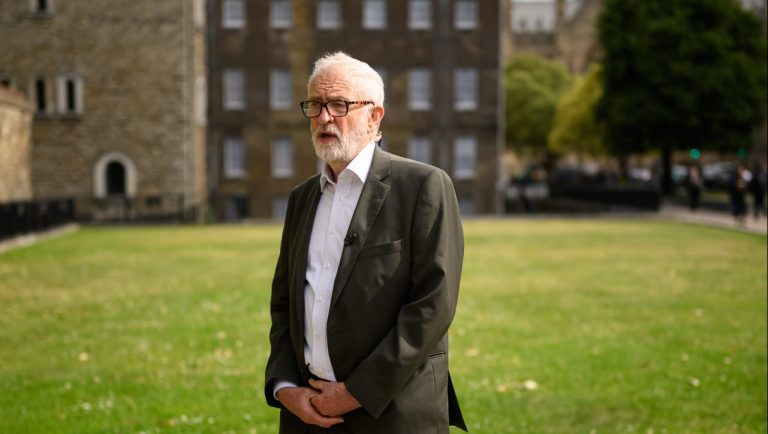James Ball is right in his assessment of the despicable Benjamin Netanyahu (TNW #447). Yet the widespread theory that he is prolonging the Gaza war because he knows electoral collapse will follow as soon as it ends is, unfortunately, wishful thinking.
An international pariah he might be becoming, but recent polling shows Netanyahu’s Likud Party is still very likely to be the largest at the next election. The only route for Naftali Bennett, the former prime minister, to displace him appears to be at the head of a coalition that would have to include Arab parties. Bennett says he will not do this, leaving Israel to face electoral stasis with Bibi still gripping the controls.
Naomi Gold
Paul Mason is right about Jeremy Corbyn and the posh hard left (TNW #447). Victory for Corbyn and his gang of well-heeled Trots would be to deny Labour being re-elected. Then, with a far right Farage government in power they could revert to type, meeting in the poshest houses, drinking the nicest wine and talking about regime change.
The irony being that the hard left don’t want power, as with government comes responsibility, hard choices and being unpopular sometimes. Another glass of Château Musar, anyone?
Alan Quinn
Prestwich, Manchester
Nigel Farage says Corbyn is more of a Brexiteer than he is. Corbyn is a Little Englander who as far back as 1979 undermined the Labour Party campaign in the European elections.
I’m sure that the vast majority of the many people who have signed up for details of this “new” party voted Remain in the referendum. When will Corbyn come clean about his views and the policy on Europe he would like this party to adopt?
Paul Connellan
It is quite right to say that Jeremy Corbyn enabled Brexit. His dislike for the globalisation and the rise of powerful trans-national companies that happened during our membership of the EU is understandable. But the improvements in quality of life for ordinary people brought about by our membership – consumer protection, working-time directives and free movement of labour – should have outweighed these.
If trade unions are a good thing, as collectively workers are stronger together, by the same logic a union of nations is stronger than individuals and would be better able to face down threats from multinational companies.
Andy McGregor
I voted twice for Jeremy Corbyn, but I certainly won’t be voting for him again. His advisers are appalling – I wouldn’t go anywhere near a party that contains Seumas Milne.
The appeal of Corbyn is that he is supposed to be a decent person and an honest politician. But his comments about allotments are nowhere near the principled politics he is meant to represent.
Latching on to eight allotments being built on (currently derelict or being re-established somewhere else) when there are 330,000 in the country is not principled, but manipulation.
Ann Harries
Suggested Reading


Why is Corbyn’s party so posh?
Paul Mason complains that the Corbyn/Sultana party aims to “destroy the Labour tradition”. But, under Starmer, Labour has already destroyed any hope of being re-elected.
Rachel Reeves and her advisers fail to understand that the government (not profit-making firms) must invest in the NHS and the public services provided by local councils. They put their faith in economic growth, but will not invest to make it possible.
Christopher Pipe
Has it occurred to Paul Mason that it’s not all about psephological tactics, and that some people simply cannot stomach the spectacle of a party that appears to condone genocide, has introduced, under the banner of socialism, a series of measures designed to make working people less well off, and whose avowed support for business has been so badly handled that economic growth has nose-dived?
We need principled but also charismatic leaders to make a difference – is there anyone out there? We seem to be stuck with creeps like Farage and Jenrick dripping their poison: the latter actually used the term “tinderbox” this week on the Today programme – the new Oswald Mosley?
Philip Barber
Alastair Campbell (Diary, TNW #447) is more excited than me by the forthcoming tome written by Nicola Sturgeon, aka Wee Sweetie. The new book has already become known as “I cannot recall” after her repeated usage of the phrase in front of the Holyrood committee.
Sturgeon was famed for her micromanaging of the SNP, and if she had applied to the Lord Lyon’s office for a heraldic crest and shield, many would suspect the motto below would be “What use is a knife if it’s not in a back?”
As it is, we’re enjoying the peace and quiet with boring John Swinney in charge while we wait for the elections in May next year to remove the SNP from power, with a bit of luck from Holyrood and from political history.
Andrew Cross
Re: Patience Wheatcroft’s view of Britain as “an unserious country with serious problems” (TNW #447). Things now move too fast and are too complex to get a fix on in terms of traditional government. Of course, the tech moguls know this better than anyone and are gearing up for the almost inevitable collapse of the nation state in favour of a new, corporate feudalism.
Adrian Dobbie
On the question of seriousness, I was told in all earnestness by a man doing a job at my house that “there are so many foreigners here my son has had to move to Spain”.
Kathy Moyse
Re: Marie Le Conte on Marseille’s lowly status among the French (TNW #447). My experience is that the French don’t know their own country. Friends in Marseille had never visited the Cévennes. Friends in the Cévennes have never visited Strasbourg. I know Paris better than my (French) French teacher did. But it is a wonderful country.
Eile Gibson
The quirky “Tch” (in the English transliteration of Tchaikovsky) that Peter Trudgill notes in TNW #447 can happen the other way round, too. In Russian usage the borrowed word “match” has an unnecessary t – as матч (match), not мач (mach), as in футбольный матч (football match).
Anthony Thacker
Hinckley, Lincolnshire
Sonia Sodha’s column on Sandie Peggie (TNW #446) may have caused upset to some readers, but it’s not anti-trans to argue that women have the right to changing and sanitary facilities they can use in comfort – and for most of us, that means the absence of those who were born male, however they identify. And this includes women with the wrong opinions – I’d support Peggie’s right to a single-sex changing room even if she had voted Leave.
It shouldn’t be difficult for organisations to provide facilities that are comfortable and safe for both groups.
Chris Russell
BELOW THE LINE
At a time when too much of the news is bleak, ”Péter Magyar, the man who can beat Orbán” (TNW #447) was such an encouraging read. Good old-fashioned campaigning in the era of toxic social media.
KATE BURGE
“America’s rotten food culture” (TNW #447) was really interesting. The states are almost like different countries bound by a common language. It makes me wonder about the possible break-up of the US at some point in the distant future.
STEPH O’HALLORAN
Silvia Marchetti on a supposed crisis in Italian teaching (TNW #447) was rather one-sided. I am a retired teacher living in the north of Italy. Yes, of course the whole school system needs a good shaking up, and granted, some teachers are not quite up to scratch. However, I have worked with many professional and dedicated teachers who love their work and make a huge difference to their students’ lives.
All schools are underfunded; underpaid teachers get no recognition.
Finally, to write well and spell correctly children need to read, which is something they should be encouraged to do at home. But let’s blame the teachers.
JOSEPHINE SWIFT



